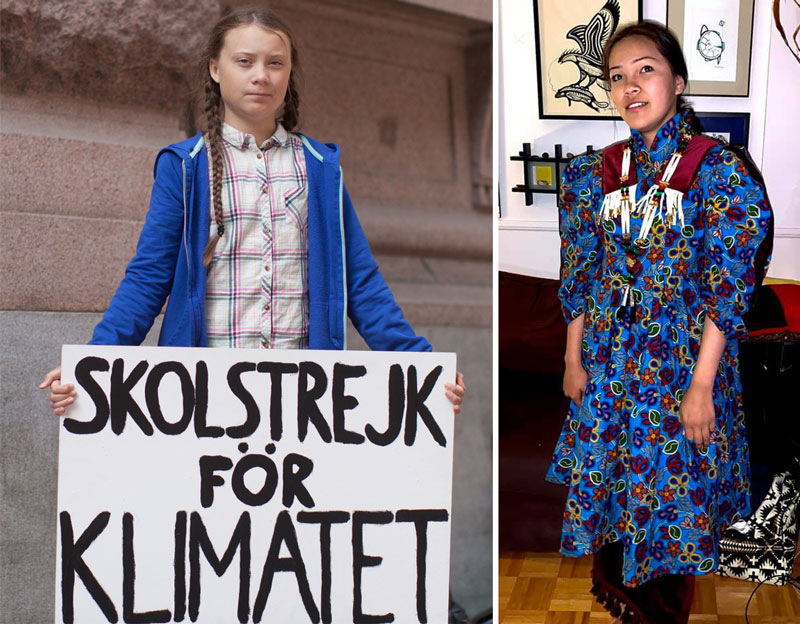The creation story was one of the first biblical narratives I ever heard. Sitting in a Sunday school class with my friends, our teacher shared the great and awe-inspiring story of a Creator who made something good out of nothing. My relationship with God changed in that moment. I realized he was not far removed, but close to his creation. Even as a child, I knew that God’s passion for the world he made was much deeper than I could ever understand. Sometime in the past 30 years, I forgot that.
On Friday, September 27, millions of people around the world marched for #schoolstrike4climate. Led by Greta Thunberg, a 16-year-old Swedish environmental activist, people from every race, gender and generation gathered to agree that the time has come to evaluate our role in climate change.
Thunberg does not advocate alone. Autumn Peltier, a 15-year-old Anishinaabe-kwe and member of the Wikwemikong First Nation in Ontario, has also stood before the UN and other political platforms to speak about the lack of clean water in numerous Indigenous communities in Canada.
Together, their message is clear—economic greed at the expense of the environment cannot continue.
While neither speaks about the need to care for the environment from a Christian perspective, when I listen to them, my mind immediately goes back to the first time I heard the story of creation. After each moment God created something out of nothing, he exclaimed that it was good. Each flower, each rushing stream, each mountain peak and each creature were formed in the hands of the Creator. Each is sacred and important, not for what they can offer humanity, but simply because they hold the fingerprints of God. Creation is sacred and our vocation is to honour and protect that sacredness.
Although I am making changes in my life, I readily admit that I do not always treat the earth as sacred. I have ignored my overuse of plastics; I have chosen to drive when I could walk; and I have made decisions purely for my own benefit or comfort. My relationship with creation has been broken and is often one-sided. Even as I strive to walk deeper with Jesus, I have failed to address my deep responsibility to creation.
But there is hope for each one of us willing to adjust our perspective. Activists like Thunberg and water carriers like Peltier remind us that God does not give up on creation, and many times he has used people outside of the church to awaken our mission. Even though all of creation was made to live in harmony, all of our relationships have been broken by the Fall. That is why Creator sent his Son, Jesus.
As a member of the evangelical church, The Salvation Army believes that “the Lord Jesus Christ has by his suffering and death made an atonement for the whole world so that whosoever will may be saved” (Doctrine #6). The cause of Christ has been traditionally understood as a restoration of the broken relationship between God and humanity, but salvation is so much deeper and wider and far-reaching than that—Jesus’ suffering and death restores the balance between Creator and all of his creation. Salvation is that big!
The mission of Creator through Jesus Christ, is to heal all creation. In A Gifting of Sweetgrass: The Reclamation of Culture Movement and NAIITS: An Indigenous Learning Community, Wendy Peterson explains that “the gospel is reconciliation: to Creator, to creation, to one’s self, and to one’s neighbour.” For God so loved the world. I am just one small part of that world, but I still have a choice to care for what has been entrusted to me.
As sure as the sun rises in the morning, as sure as the seasons change, God is still the Creator. As days go by, he ensures that the flowers will bloom, the sparrows will have food and the tides will roll. Each day he still calls us to walk gently with creation, to care for its beauty and to never forget its sacredness.
Captain Crystal Porter is the divisional youth secretary in the Prairie Division.
Photos (above): Greta Thunberg: Anders Hellberg/Wikimedia Commons; Autumn Peltier: facebook.com/Waterwarrior1/
Comment
On Wednesday, October 16, 2019, Reverend Norm Gardner said:
On Tuesday, October 8, 2019, Dianne Hill said:
As a fifth generation Salvationist, who left the Army and became a minister in The United Church of Canada, I applaud your stance on Creation and taking care of it. I’ve often felt, that the worldwide Army makes a difference in so much of life, that here’s another important issue that has implications for the whole world. May there come a time again, when God can say of creation , ‘it’s not only good, it’s very good”. May God bless us all as we work to bring creation back I to its former glory.
Leave a Comment
A Lenten Pathway to Right Relationships
Walking softly with the United Nations Declaration on the Rights of Indigenous Peoples.
by Captain Crystal Porter FeaturesIn this Lenten season, we invite you to join us as we reflect on the wisdom of Scripture, listen to the voices of Indigenous Peoples and practise lament, using a new resource created by the territorial Indigenous ministries department: “Walking Softly With the Declaration: A Lenten Pathway to Right Relationships.”
Walking Gently Together
Tracy Desjarlais, Indigenous liaison, shares the importance of building bridges between the Army and First Nations.
Features“A handshake goes a long way,” says Tracy Desjarlais (Piapot First Nation of Saskatchewan), Indigenous liaison for public affairs and emergency disaster services (EDS) for the Canada and Bermuda Territory. “And to build trust within the nations, it’s important for us to be present.” As part of The Salvation Army’s commitment to establishing this
Read More
The Bread of Life
Jesus offers transformation, not transaction.
by Major Corinne Cameron Opinion & Critical ThoughtIn the Gospel of John, Jesus provides seven names of relationship that teach us how we may be in relationship with him. Over this next year, we are going to visit each one of these “I am” statements of Jesus.










Sola Deo gloria